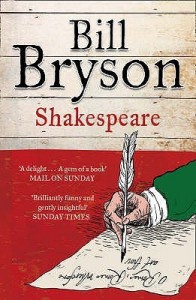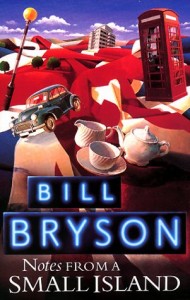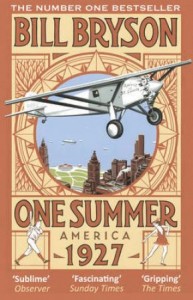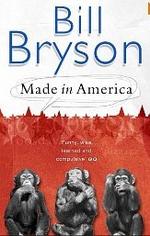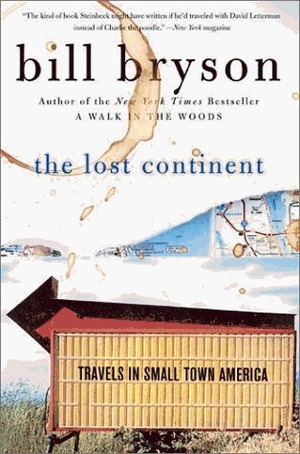 Jeg fant en kopi av Bill Brysons The Lost Continent på Fretex i Storgata på Lillehammer på vei hjem fra høstferie i år. Jeg eier en del Bryson-bøker, men ikke denne (før nå), av en eller annen grunn. Jeg innbiller meg at jeg har lest den, en gang rundt årtusenskiftet, men kanskje jeg lånte den på biblioteket? Vel, jeg begynte på den ganske med en gang (jeg hadde pakket ufornuftig og det var den boka som var lettest tilgjengelig mens jeg fortsatt var på reise), men kom ikke mange sidene ut i boka før jeg ble veldig i tvil om jeg faktisk skulle lese videre.
Jeg fant en kopi av Bill Brysons The Lost Continent på Fretex i Storgata på Lillehammer på vei hjem fra høstferie i år. Jeg eier en del Bryson-bøker, men ikke denne (før nå), av en eller annen grunn. Jeg innbiller meg at jeg har lest den, en gang rundt årtusenskiftet, men kanskje jeg lånte den på biblioteket? Vel, jeg begynte på den ganske med en gang (jeg hadde pakket ufornuftig og det var den boka som var lettest tilgjengelig mens jeg fortsatt var på reise), men kom ikke mange sidene ut i boka før jeg ble veldig i tvil om jeg faktisk skulle lese videre.
Jeg skrev aldri om min seneste gjenlesing av det som har vært favoritten min av Brysons bøker, Notes from a Small Island (men her er et lenger innlegg om den fra 2015). Jeg leste den om igjen rett etter å ha lest The Road to Little Dribbling: More Notes from a Small Island, delvis for å motvirke skuffelsen over oppfølgeren, og husker at jeg la merke til minst et tilfelle av fettfobi (han er lite sjarmerende i sin karakteristikk av en familie han deler frokostsal med på en B&B), men det var en litt ubehagelig hump på en ellers trivelig tur, liksom.
Men i denne boka? Det er fettfobi på hva som føles som annenhver side. Det starter allerede på side 6 (trigger warning, by the way):
Iowa women are almost always sensationally overweight – you see tham at Merle Hay Mall in Des Moines on Saturdays, clammy and meaty in their shorts and halter tops, looking a little like elephants dressed in children’s clothes (…) the teenaged daughters of these fat women are always utterly delectable, as soft and gloriously rounded and naturally fresh-smelling as a basket of fruit. I don’t know what it is that happens to them, but it must be awful to marry one of those nubile cuties knowing that there is a time bomb ticking away in her that will at some unknown date make her bloat out into something huge and grotesque, presumably all of a sudden and without much notice, like a self-inflating raft from which the pin has been yanked.
Ja, og så ispedd litt creepy «voksen mann som snakker om hvor attraktive tenåringsjenter er», da. Lekkert.
Da de neste to tilfellene kom på side 25 og 30 lurte jeg veldig på om jeg bare skulle la boka ligge igjen på Lillehammer, for å være helt ærlig. Men så ble det til at jeg leste videre, med en sånn litt sykelig fascinasjon. Og jeg begynte å markere alle stedene Bryson er fettfobisk, rasistisk og diverse-andre-former-for-«istisk» (blant annet en ganske rett fram funkofobisk setning). Ikke alle tilfellene er like clean-cut som det jeg siterte over, ofte er det bare en helt unødvendig bemerkning om hvor utrolig feit en person han møter er, og rasismen er ganske merkelig, for den dukker opp innimellom ærlige forsøk på å være anti-rasistisk og fortelle om historiske skeivheter, men den er der likefult.
Men det merkeligste med boka er at den liksom ikke har noen egentlig rød tråd. Undertittelen er «travels in small-town America», men Bryson besøker storbyer som Philadelphia, Washington DC og New York. Og når han er i små byer hører vi ofte mer om motellet enn om byen. Og uten at jeg har tenkt å kontrolltelle sidene vil jeg tippe at mer enn 50 % av handler om at Bryson sitter i bilen på vei mellom byene han besøker. Han besøker 38 av «the lower 48 states» (kanskje ikke rart det blir mye bilkjøring), uten at det er spesielt opplagt hvorfor han ikke også besøker de ti siste. Og det verste er at det jeg skrev om Notes from a Small Island, «Bryson actually really seems to enjoy travelling, including the less glamorous bits», ikke stemmer om denne boka. Mye av tiden gir han inntrykk av at han heller ville vært hjemme, og det er et veldig dårlig utgangspunkt for en reiseskildring.
Hadde det vært en fantastisk reiseskildring hadde den likevel vært ødelagt av all forakten Bryson viser for sine medmennesker, men nå er det hele bare trist. Ikke minst fordi Bryson selv ikke akkurat er en sylfide og fettfobien hans går også ut over ham selv, i Santa Fe skal han besøke niesen sin som studerer der og klarer å karakterisere seg selv som ekkel to ganger i løpet av få sider, inkludert når de faktisk treffes og han «embarrassed her – possibly even grossed her out – with a hug» (side 231). Man kan bli deprimert av mindre.
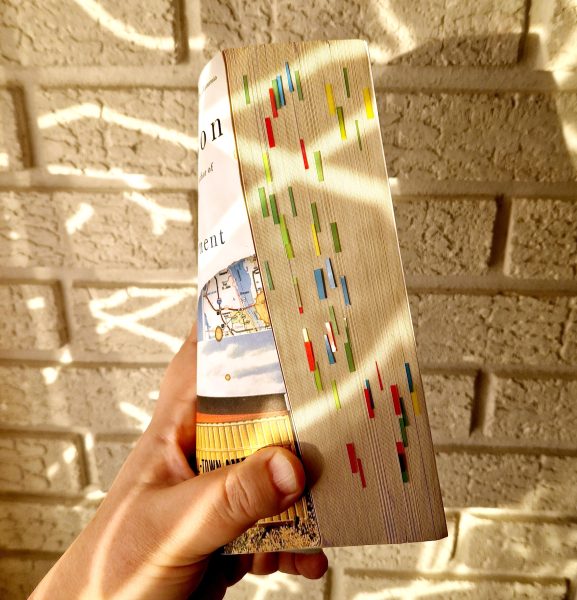
Boka har jeg kjøpt sjøl.
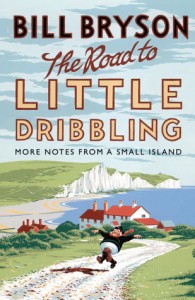 The Road to Little Dribbling: More Notes from a Small Island by Bill Bryson moved swiftly to the top of my reading pile when my parents off-loaded their copy on us and was consumed within a few days of my getting my hands on it. No wonder, perhaps, Bryson being one of my favourite writers and Notes from a Small Island probably my favourite of his books. And in many respects The Road to Little Dribbling fulfills its promises. Here is the pure delight in travelling, especially by bus in Britain, that I so recognise. Here is the love for the more absurd aspects of Englishness. Here are the masses of odd little anecdotes and facts that Bryson is a master of. But I was, perhaps strangely, disappointed anyway. Partly because I have lamented the lack of Scotland in the previous volume, and here I was promised Scotland and then it turns out that England take up 355 of the book’s 381 pages, Wales (not that I mind Wales) 15 and Scotland a measly 11. And partly, well, in parts it feels a little… stale? It’s not that I didn’t like it, I did, but I guess I didn’t LOVE it. But lets think of happier things and quote a bit I do like (love):
The Road to Little Dribbling: More Notes from a Small Island by Bill Bryson moved swiftly to the top of my reading pile when my parents off-loaded their copy on us and was consumed within a few days of my getting my hands on it. No wonder, perhaps, Bryson being one of my favourite writers and Notes from a Small Island probably my favourite of his books. And in many respects The Road to Little Dribbling fulfills its promises. Here is the pure delight in travelling, especially by bus in Britain, that I so recognise. Here is the love for the more absurd aspects of Englishness. Here are the masses of odd little anecdotes and facts that Bryson is a master of. But I was, perhaps strangely, disappointed anyway. Partly because I have lamented the lack of Scotland in the previous volume, and here I was promised Scotland and then it turns out that England take up 355 of the book’s 381 pages, Wales (not that I mind Wales) 15 and Scotland a measly 11. And partly, well, in parts it feels a little… stale? It’s not that I didn’t like it, I did, but I guess I didn’t LOVE it. But lets think of happier things and quote a bit I do like (love):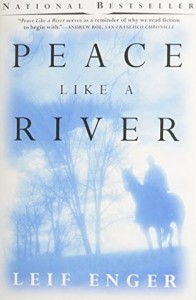 Peace Like a River by Leif Enger was our book circle book over Christmas, and I rather enjoyed it while reading it. However, it’s now a month later and I find I can’t really remember what was so good about it, and though the plot is pretty clear to me, the feelings it generated have not made a lasting impression. A bit of a luke-warm recommendation, then. The book circle were split in their opinions, some couldn’t finish the book, while others, like me, were more enthusiastic.
Peace Like a River by Leif Enger was our book circle book over Christmas, and I rather enjoyed it while reading it. However, it’s now a month later and I find I can’t really remember what was so good about it, and though the plot is pretty clear to me, the feelings it generated have not made a lasting impression. A bit of a luke-warm recommendation, then. The book circle were split in their opinions, some couldn’t finish the book, while others, like me, were more enthusiastic.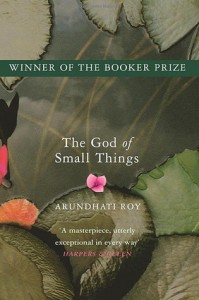 Then for our February meeting we read The God of Small Things by Arundhati Roy, and again, the reception was mixed. I found it slow to begin with, but then, suddenly, at around 120 pages, it turned a corner and after that I could hardly put it down. There is someting compelling about the way Roy takes us back and forth between past and present and the quirks of the language were wonderful, I thought.
Then for our February meeting we read The God of Small Things by Arundhati Roy, and again, the reception was mixed. I found it slow to begin with, but then, suddenly, at around 120 pages, it turned a corner and after that I could hardly put it down. There is someting compelling about the way Roy takes us back and forth between past and present and the quirks of the language were wonderful, I thought.